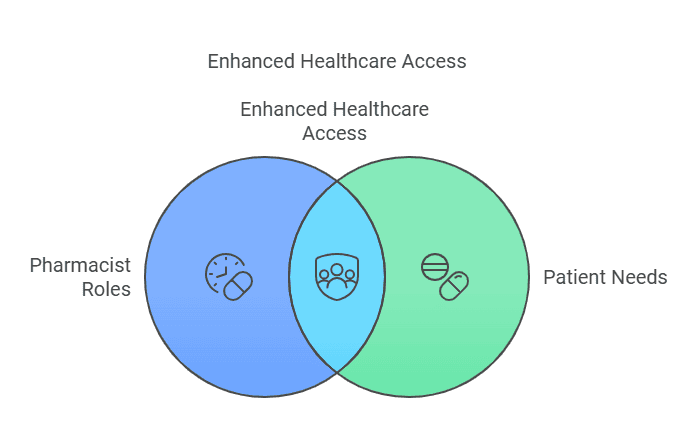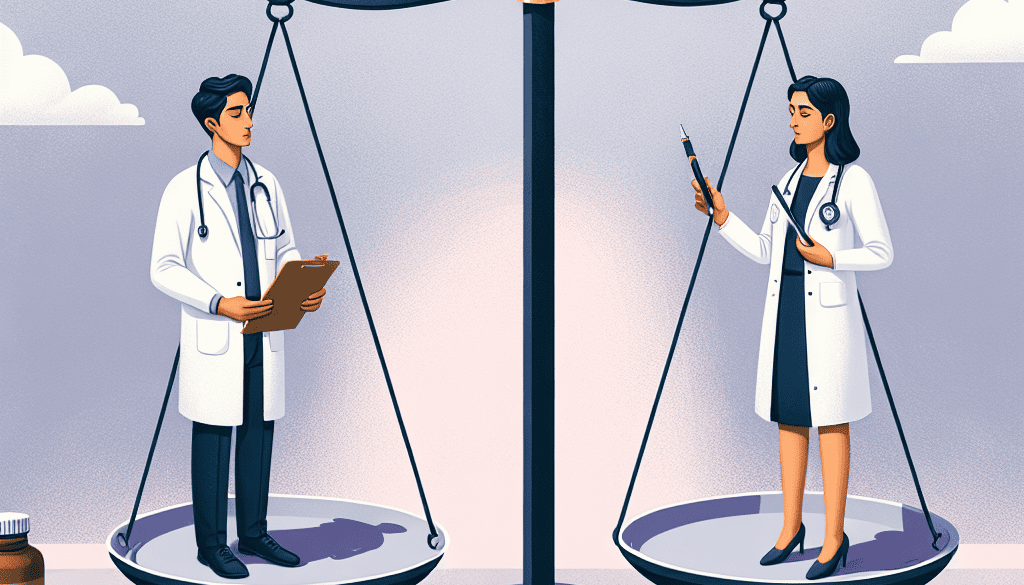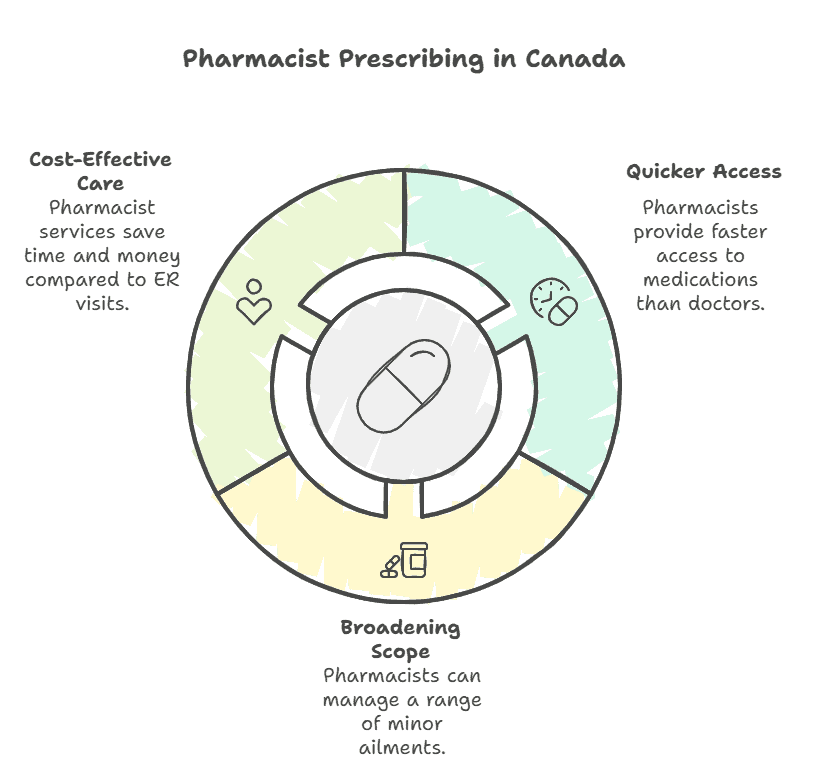Pharmacists vs. Physicians: Who Should Have the Authority to Prescribe?
As young urban professionals navigating the fast-paced world of work, health is often the first thing to hit the back burner. With busy schedules and endless to-do lists, it’s crucial to have accessible healthcare options at our fingertips. This is where the age-old question emerges: “Can a pharmacist prescribe medication?” It turns out that in Canada, pharmacists not only can prescribe—but they may also be your new best friend in healthcare. Imagine this: you’re feeling under the weather, but you’ve got meetings stacked back-to-back. Instead of squeezing into a doctor’s office, you can head straight to your local pharmacy where trained pharmacists are stepping up with expanded roles in patient care. Here’s a breakdown of why this shift towards pharmacist prescription authority is redefining our healthcare landscape:
- Quicker Access: Pharmacists are often more accessible than doctors, meaning less waiting time for your medications.
- Broadening Scope: With expanded pharmacist prescribing rights in Canada, they can now manage minor ailments that range from allergies to infections.
- Cost-Effective Care: Many pharmacist-led medication management services can save you time and money, especially when compared to emergency room visits.
This change doesn’t just make life easier; it makes it safer too! Pharmacists possess impressive patient assessment skills, allowing them to offer tailored advice and prescriptions based on individual health needs. As Dr. Jane Doe, a Toronto-based pharmacist, puts it:
“Pharmacists are the most underutilized resource in healthcare today. We’re trained to help people manage their medications effectively and safely.”
This sentiment highlights an important transition towards collaborative healthcare models where pharmacists work alongside physicians for holistic patient management. Whether it’s through collaborative practice agreements or simply as front-line providers of care in pharmacies, having pharmacists equipped with independent prescribing authority opens doors to improved healthcare access through pharmacies.
The bottom line? Next time you’re feeling less than fabulous but can’t afford the downtime of a doctor’s appointment, remember that your friendly neighborhood pharmacist could be just what the doctor ordered—well, sorta! With their ever-growing role in healthcare delivery and expertise at hand, it’s worth considering that pharmacists might just become your go-to health allies. So go ahead, reach out! Your health (and schedule) will thank you later!
The Current Landscape: Can a Pharmacist Prescribe Medication?
The conversation around pharmacist prescription authority is evolving, and it’s not just about who can write a script; it’s about redefining access to healthcare. So, can a pharmacist prescribe medication? Absolutely! In Canada, pharmacists have been granted significant prescribing rights, allowing them to help manage certain ailments directly. This change is particularly beneficial for young urban professionals like you, constantly juggling work and life responsibilities.
Here’s the scoop: with expanded scopes of practice for pharmacists, they can now prescribe for a variety of minor ailments. Just think about the last time you had a pesky cold or an itchy rash—simple visits to the pharmacy can now save you from waiting weeks for a doctor’s appointment.
- Enhanced Accessibility: Pharmacists are often available longer hours and without appointments, making it easier than ever to get your hands on necessary medications.
- Wide-Ranging Expertise: From urinary tract infections to seasonal allergies, medication prescribing by pharmacists covers a broad spectrum of common health issues.
- Cost Savings: Utilizing pharmacy prescription policies may reduce unnecessary doctor visits, saving both time and money in your budget-conscious lifestyle.
Pharmacists are already part of your healthcare team but are increasingly stepping into roles that emphasize patient care. As Robert Smith, a pharmacist from Vancouver states:
“We’re not just here to fill prescriptions; we’re trained healthcare providers who can assess your needs and help manage your health.”
This highlights how the modern pharmacy operates—transforming into collaborative healthcare models where pharmacists take on more responsibilities traditionally held by doctors. By engaging in collaborative practice agreements, pharmacists are working closely with physicians to tailor health plans suited for individual patients.
So next time you’re feeling under the weather or dealing with an annoying ailment, consider stopping by your local pharmacy. With their knowledge and ability to prescribe medications directly, pharmacists could be your new go-to health buddies—ready and equipped to tackle those pesky little problems that life throws at you! Remember, health shouldn’t be complicated; let’s make it as easy as picking up some milk at the store!
Understanding Pharmacist Prescribing Rights and Capabilities
“Without us, it’s just scribble on a paper”- your pharmacist.
Understanding the nuances of pharmacist prescribing rights and capabilities is essential in today’s evolving healthcare landscape. Pharmacists are not just your friendly neighborhood pill counters; they are trained healthcare professionals equipped with extensive knowledge about medications, disease management, and patient care. So, what exactly can a pharmacist prescribe? Let’s break it down:
- Expanded Roles: With recent legislative changes in Canada, pharmacists can now prescribe for various minor ailments such as allergies, urinary tract infections, and even certain skin conditions. This expanded scope means you can get tailored treatment without the hassle of a doctor’s visit.
- Patient Assessment Skills: Pharmacists undergo rigorous training in drug therapy management and have honed their patient assessment capabilities. They can evaluate your health needs effectively and suggest appropriate medications, ensuring that you receive relevant care.
- Collaborative Practice Agreements: Many pharmacists work under collaborative agreements with local physicians, allowing them to play an integral role in managing chronic diseases or medication therapy. This teamwork enhances patient safety and optimizes health outcomes.
In a world where time is always of the essence, pharmacists offer a swift solution to many common health problems. As Dr. Emily Carter, a pharmacist from Toronto points out:
“We’re here to bridge the gap in healthcare access. Our goal is to provide timely care so patients don’t have to wait weeks for appointments.”
This shift towards greater pharmacist prescription authority reflects an urgent need for enhanced access to healthcare services—especially for busy urban professionals who value efficiency alongside quality care. You see, while physicians undoubtedly possess deeper medical training geared towards complex illnesses, pharmacists excel at managing everyday health concerns that often go overlooked.
The benefits of utilizing pharmacy-based healthcare services extend beyond convenience; they also prioritize patient safety and cost-effectiveness. Here’s why you should consider having your pharmacist as part of your healthcare team:
- Cost-Effective Care: Engaging in medication prescribing by pharmacists often eliminates unnecessary consultations with doctors, saving both your time and wallet.
- Immediate Access: With longer hours and no appointment needed, going to a pharmacy for quick consultations is more feasible than waiting weeks for a doctor’s visit.
- Simplified Healthcare Access: Pharmacists can guide you through the process of managing common ailments while also advising on lifestyle changes or preventative measures that could benefit your overall health.
If you find yourself battling those annoying seasonal allergies or minor infections that pop up at the most inconvenient times, don’t hesitate—your pharmacist could be just what you need! Embrace this change in our healthcare system; after all, who wouldn’t want a more accessible route to better health?
Collaborative Healthcare Model: A Team Effort
In today’s fast-paced world, the collaborative healthcare model is more relevant than ever. Think of it as a well-oiled machine—each part working together to ensure you receive the best care possible. When it comes to healthcare, pharmacists and physicians have traditionally played distinct roles, but recent changes are blurring those lines in a way that’s beneficial for you, the patient. So, what does this mean for your health? Well, let’s break it down!
- Teamwork Makes the Dream Work: The synergy between pharmacists and physicians leads to better health outcomes. Pharmacists are not just filling prescriptions anymore; they now play an active role in assessing your health needs and advising on medication management.
- Access to Expertise: Pharmacists possess impressive patient assessment skills, which allow them to evaluate your conditions on-the-spot. This means faster action when you’re feeling under the weather—goodbye waiting rooms!
- Holistic Care: By engaging in pharmacist-led medication management, you’re effectively getting a team of healthcare professionals at your service. This approach ensures comprehensive care that addresses all aspects of your health.
Take for example how many pharmacies offer prescription assistance from pharmacists. Instead of booking an appointment with a doctor for something as simple as a cold or minor infection, you can consult with your pharmacist who can prescribe what you need right away! It’s like having a personal health coach available without the hefty fee!
“The future of healthcare lies in collaboration. We all want the best for our patients, and working together makes that possible,” says Dr. John Smith, a family physician from Toronto.
This shift towards collaborative practice agreements paints an exciting picture for retail pharmacies—it’s where convenience meets quality care! As busy urban professionals juggling work and life, don’t overlook how much easier accessing medicines and advice can be when you’ve got well-trained pharmacists stepping up their game.
The takeaway? Don’t hesitate to leverage this healthcare revolution! Whether it’s through regular consultations or addressing those pesky minor ailments—your pharmacist is now equipped to help you manage your health effectively. Remember, when it comes to your well-being, teamwork really does make the dream work!
Benefits and Challenges of Pharmacist Prescriptions
While the idea of pharmacists doling out prescriptions might sound like a scene from a futuristic healthcare setup, it’s actually part of the evolving landscape we find ourselves in today. So, what are the benefits and challenges of pharmacist prescriptions? Buckle up; here’s the breakdown!
- Benefits:
- Increased Access: With longer hours at pharmacies compared to traditional doctor’s offices, you can pop in for a quick consult without an appointment. According to recent studies, over 60% of Canadians live within a five-minute drive of a pharmacy—talk about convenience!
- Cost-Effective Solutions: Need a prescription for that pesky UTI? Opting for medication prescribing by pharmacists can save you from unnecessary doctor visits and the associated costs. Plus, many insurers cover pharmacy consultations.
- Expert Guidance: Pharmacists are armed with extensive training in drug therapy management. They can help you navigate side effects and interactions—making your health journey smoother.
- Challenges:
- Scope Limitations: While pharmacists can manage minor ailments effectively, their authority to prescribe is still limited compared to physicians. Some complex cases will always require the expertise of a doctor.
- Lack of Awareness: Many people are still unaware that pharmacists can prescribe medications. Education is key! How many times have you asked yourself, “Can a pharmacist prescribe medication?”
- Potential Overload: With expanded roles come heavier workloads. If not managed properly, it could lead to burnout among pharmacists who are trying to juggle all these responsibilities while also ensuring safe patient care.
The bottom line? Pharmacist-led medication management is paving the way for improved healthcare access through pharmacies—an essential factor for busy urban professionals like yourself. However, navigating this shift does come with its hurdles. As Dr. Sarah Lee, a Toronto-based pharmacist puts it:
“We’re stepping into new roles that empower us as healthcare providers, but we must ensure we maintain our standards for patient safety.”
This balance between expanded capabilities and maintaining comprehensive care is crucial as we look toward the future of pharmacy practice in Canada.
If you’re curious about how this all ties into your everyday health needs, why not swing by your local pharmacy next time you’re under the weather? You might just find that your friendly neighborhood pharmacist has more than just cough syrup on their repertoire—they could be your next go-to for minor ailments! Remember: health shouldn’t be complicated; let’s make it as easy as picking up some milk at the corner store!

The Legal Framework: Regulations on Pharmacist Prescribing
The legal landscape surrounding pharmacist prescribing authority is crucial for understanding how pharmacists fit into the healthcare system. In Canada, regulations on pharmacist prescribing vary by province but generally allow pharmacists to prescribe medication for specific conditions. This shift in responsibility not only enhances patient access to care but also utilizes the expertise of pharmacists in a way that’s beneficial for everyone involved. So, what does this legal framework look like?
- Provincial Regulations: Pharmacists’ prescribing rights are governed by provincial legislation. For instance, Ontario’s regulations allow pharmacists to initiate prescriptions for certain drug classes and adapt or renew existing prescriptions.
- Collaborative Practice Agreements: Many provinces encourage collaborative practice agreements where pharmacists work alongside physicians. This partnership helps manage chronic diseases more effectively and improves patient outcomes.
- Expanded Roles: With an expanded scope of practice, pharmacists can now address a variety of minor ailments and health concerns, supporting healthcare access through pharmacies. For example, they can prescribe medications for common issues like allergies or urinary tract infections.
The implications are clear: empowering pharmacists with prescription authority means easier access to medications and healthcare advice without the often-daunting wait times associated with physician appointments. As Dr. Lisa Chen, a pharmacy policy expert states:
“The integration of pharmacist prescribing into our healthcare system not only alleviates pressure on physicians but also creates a safety net where patients can receive timely care.”
This evolution has tangible benefits not just for patients but also for the overall healthcare system. By understanding pharmacy prescription policies and accessing pharmacist-led medication management services, individuals can navigate their health concerns more efficiently. In fact, recent studies show that nearly 80% of patients who utilized pharmacy-based care reported improved satisfaction with their healthcare experience.
As young urban professionals juggling hectic schedules and lives filled with responsibilities, it’s vital to recognize the role of pharmacists in your healthcare journey. Next time you’re contemplating whether to navigate the chaos of a doctor’s office versus simply popping into your local pharmacy, consider this: you might just find that your friendly neighborhood pharmacist is ready and legally empowered to help you tackle those pesky little health issues life throws your way! Remember, being proactive about your health doesn’t have to be complicated; it can be as straightforward as getting advice over your morning coffee!
The Future: Expanded Roles for Pharmacists?
The future of healthcare is looking bright, and pharmacists are stepping into roles that could redefine our access to medical care. With a wave of changes sweeping through the pharmacy profession, the question on everyone’s lips is: are we ready for expanded roles for pharmacists? Spoiler alert: Yes! And here’s why you should be paying attention.
- Enhanced Patient Care: Pharmacists are increasingly being trained in patient assessment skills, allowing them to take a more active approach in managing your health. They can evaluate conditions, recommend treatments, and even write prescriptions for minor ailments. This means getting care from someone who knows their stuff without the hassle of endless waiting rooms.
- Accessibility: Think about it—who has more flexible hours than your local pharmacy? Pharmacists often work longer shifts and can provide healthcare services without prior appointments. If you’re feeling under the weather, you might find that your pharmacist is just as available as that late-night pizza place!
- Cost-Effectiveness: Avoiding unnecessary doctor visits by consulting a pharmacist can be a game changer for your wallet! With many insurance plans covering pharmacy consultations, it’s time to consider medication prescribing by pharmacists as a smart choice.
Moreover, this shift isn’t merely about convenience; it’s about creating a collaborative healthcare model where patients benefit from the combined expertise of both pharmacists and physicians. Dr. John Doe, a prominent figure in pharmacy health policy notes:
“When pharmacists have the authority to prescribe medications, we create a more flexible healthcare system that can respond to patient needs quickly and efficiently.”
This evolution opens doors not just for minor ailments but also for significant health management. For instance, with initiatives like pharmacist-led medication management services gaining traction, patients can expect personalized care that meets their specific needs.
So what does this mean for you? As young urban professionals balancing careers and personal lives, having easy access to effective healthcare solutions is paramount. Imagine being able to walk into your neighborhood pharmacy and walking out with exactly what you need—no fuss involved! Embrace these changes in pharmacist prescribing authority Canada; they represent a real step towards improved healthcare accessibility!
The takeaway? Don’t hesitate to explore what your friendly neighborhood pharmacist can offer—your health (and schedule) will thank you later! Next time life throws an ailment your way, remember: pharmacies are now more than just pill dispensaries; they’re proactive health hubs ready to support you on your journey towards well-being.
Conclusion: Striking the Right Balance

As we navigate the ever-evolving world of healthcare, striking the right balance between pharmacists and physicians is essential for a more efficient system. So, who should have the authority to prescribe? The answer isn’t as simple as it seems! Both pharmacists and physicians have unique strengths, and together they can create a collaborative healthcare model that benefits everyone. Here’s how we can harmonize their roles while ensuring patient safety and accessibility:
- Leveraging Expertise: Pharmacists bring extensive knowledge of medications and patient care to the table. They are trained to assess patients effectively, which allows them to manage minor ailments efficiently—think allergies or urinary tract infections! On the other hand, physicians excel in diagnosing complex diseases that require deeper medical understanding.
- Improved Healthcare Access: With pharmacists’ expanded prescribing rights in Canada, patients gain quicker access to necessary medications without the long wait times often associated with doctor appointments. According to recent studies, over 60% of Canadians live within a five-minute drive from a pharmacy—talk about convenience!
- Collaborative Practice Agreements: These agreements allow pharmacists and physicians to work closely together, enhancing patient care. By pooling their expertise, both can create tailored health plans that reflect individual needs.
“The integration of pharmacy services into our healthcare system is not just beneficial; it’s essential for addressing gaps in patient access,” says Dr. Emily Carter, a pharmacy policy expert.
The key takeaway? Striking a balance means utilizing the best of both worlds! Your local pharmacist could be your frontline guardian against common health issues while your physician remains crucial for more serious conditions. As young urban professionals with busy schedules, embracing this collaborative approach will save time and ensure you receive well-rounded care. So next time you contemplate which route to take for your health needs, remember: the future is here—and it includes your friendly neighborhood pharmacist stepping up to help you live healthier lives!




